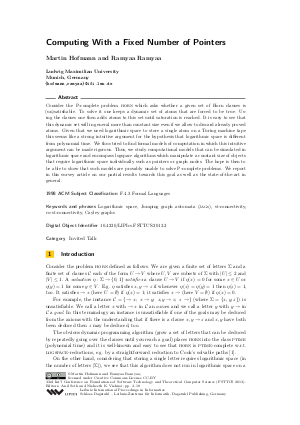Computing With a Fixed Number of Pointers (Invited Talk)
Authors Martin Hofmann, Ramyaa Ramyaa
-
Part of:
Volume:
IARCS Annual Conference on Foundations of Software Technology and Theoretical Computer Science (FSTTCS 2013)
Part of: Series: Leibniz International Proceedings in Informatics (LIPIcs)
Part of: Conference: IARCS Annual Conference on Foundations of Software Technology and Theoretical Computer Science (FSTTCS) - License:
 Creative Commons Attribution 3.0 Unported license
Creative Commons Attribution 3.0 Unported license
- Publication Date: 2013-12-10
File

PDF
LIPIcs.FSTTCS.2013.3.pdf
- Filesize: 0.6 MB
- 16 pages
Document Identifiers
Subject Classification
Keywords
- Logarithmic space
- Jumping graph automata
- st-connectivity
- co-st-connectivity
- Cayley graphs
Metrics
- Access Statistics
-
Total Accesses (updated on a weekly basis)
0PDF Downloads0Metadata Views
Abstract
Consider the P-complete problem Horn which asks whether a given set of Horn clauses is (un)satisfiable. To solve it one keeps a dynamic set of atoms that are forced to be true. Using the clauses one then adds atoms to this set until saturation is reached. It is easy to see that this dynamic set will in general more than constant size even if we allow to discard already proved atoms. Given that we need logarithmic space to store a single atom on a Turing machine tape this seems like a strong intuitive argument for the hypothesis that logarithmic space is different from polynomial time. We thus tried to find formal models of computation in which this intuitive argument can be made rigorous. Thus, we study computational models that can be simulated in logarithmic space and encompass logspace algorithms which manipulate a constant size of objects that require logarithmic space individually such as pointers or graph nodes. The hope is then to be able to show that such models are provably unable to solve P-complete problems. We report in this survey article on our partial results towards this goal as well as the state-of-the-art in general.
Cite As Get BibTex
Martin Hofmann and Ramyaa Ramyaa. Computing With a Fixed Number of Pointers (Invited Talk). In IARCS Annual Conference on Foundations of Software Technology and Theoretical Computer Science (FSTTCS 2013). Leibniz International Proceedings in Informatics (LIPIcs), Volume 24, pp. 3-18, Schloss Dagstuhl – Leibniz-Zentrum für Informatik (2013)
https://doi.org/10.4230/LIPIcs.FSTTCS.2013.3
BibTex
@InProceedings{hofmann_et_al:LIPIcs.FSTTCS.2013.3,
author = {Hofmann, Martin and Ramyaa, Ramyaa},
title = {{Computing With a Fixed Number of Pointers}},
booktitle = {IARCS Annual Conference on Foundations of Software Technology and Theoretical Computer Science (FSTTCS 2013)},
pages = {3--18},
series = {Leibniz International Proceedings in Informatics (LIPIcs)},
ISBN = {978-3-939897-64-4},
ISSN = {1868-8969},
year = {2013},
volume = {24},
editor = {Seth, Anil and Vishnoi, Nisheeth K.},
publisher = {Schloss Dagstuhl -- Leibniz-Zentrum f{\"u}r Informatik},
address = {Dagstuhl, Germany},
URL = {https://drops.dagstuhl.de/entities/document/10.4230/LIPIcs.FSTTCS.2013.3},
URN = {urn:nbn:de:0030-drops-44009},
doi = {10.4230/LIPIcs.FSTTCS.2013.3},
annote = {Keywords: Logarithmic space, Jumping graph automata, st-connectivity, co-st-connectivity, Cayley graphs}
}
